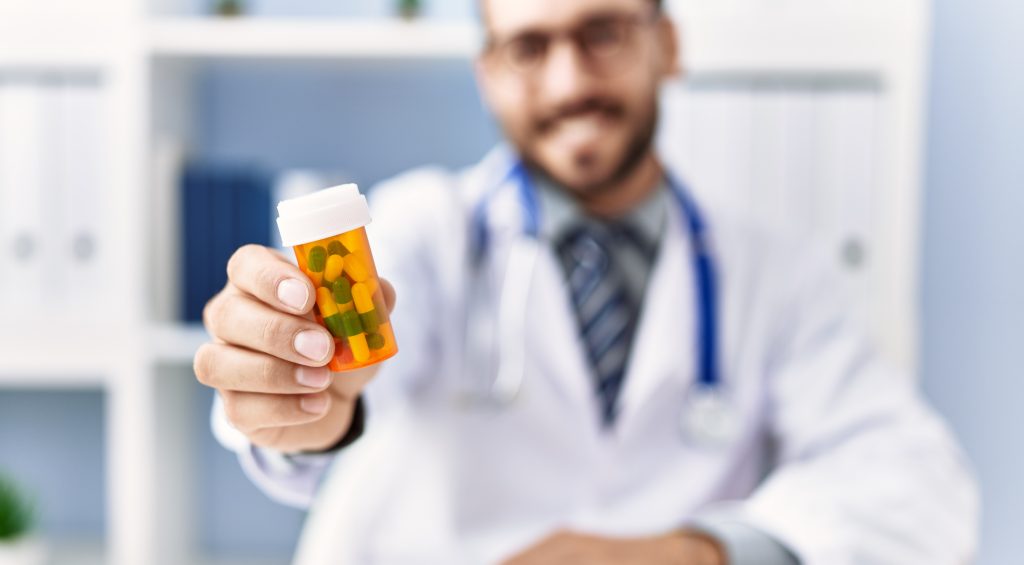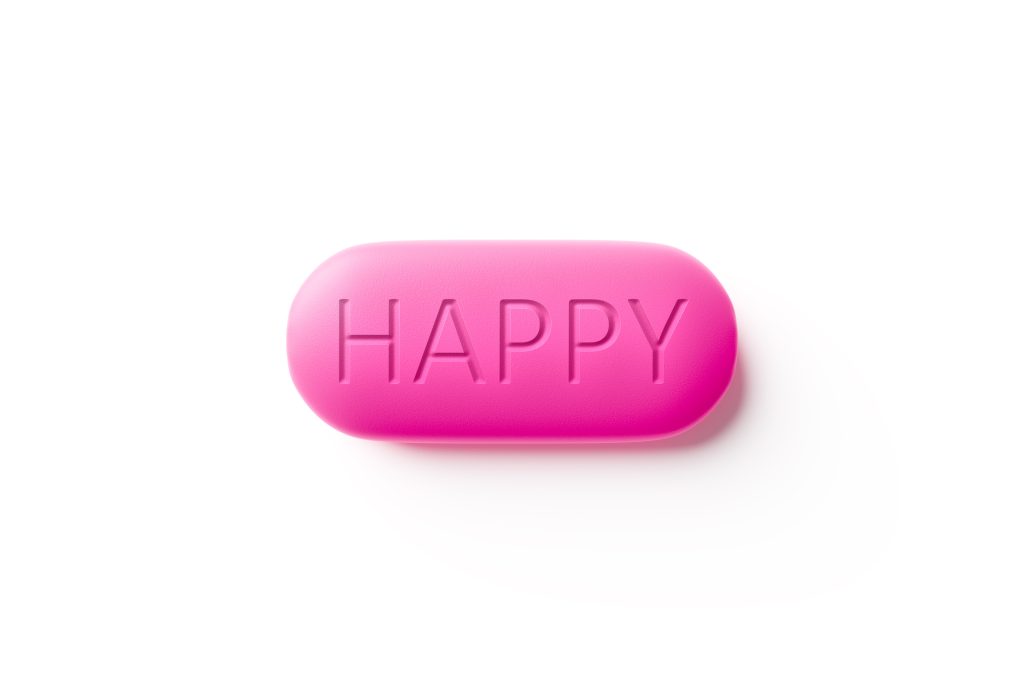
I know there’s no such thing as a “happy 🙂 pill.” But for some people, there are some medications that come close.
The issue of psychotropic medication (that’s medication to help with mental health symptoms) comes up frequently in my line of business. Opinions about taking these meds run the gamut from the idea that medication is evil to absolutely necessary. And, believe me, people can have pretty strong opinions about medication!
There’s the opinion that “people who need medication to live their lives are weak and there’s nothing so difficult that you can’t figure out how to deal with it without swallowing a pill.” Ouch.
There’s the opinion that medication may be fine for “other people,” but not for me. There’s the opinion that “if I don’t like this feeling, there should be a pill that will make it go away.” I’ve heard everything from “Better living through chemistry!” to “I’m not taking medication, I’m not crazy!”
If You Have One Or More Of These Symptoms, You Should Ask Your Doctor About Taking…
It’s easy for me to understand why there are so many ideas about psychotropic medication that are just completely false.
I don’t think anyone gets a great education about this stuff. Sometimes the only information people get about medications comes from the advertising they see on TV or in magazines for various anti-depressants, mood stabilizers, and anti-anxiety medications.
You can either end up thinking these drugs are a panacea, a cure-all, for whatever negative feeling you might have OR you can end up thinking you’d much rather feel depressed than have to deal with side effects like seizures, muscle paralysis, or death. It depends on what parts of the ads you pay attention to, I guess.
So, Does Medication Help or Not?
When someone asks me if the medication can help them, I’ve been trained to answer “It depends.” Because it does.
The whole notion of whether medication may be helpful or necessary when you’re trying to deal with a mental health issue is very complicated. There is no one right answer…you need to look at the issue on a case-by-case basis.
Some people struggle far too long with horrible psychological symptoms when a medication would help them to get better much faster. Some of my clients can’t even make use of any of the therapy techniques I can teach them until they are on medication. I do believe that some people, given their diagnosis, may never achieve relief without medication. More on that in a moment.
And some people over-rely on medications to mask feelings that are normal and that they could cope with on their own…and some of those medications are addictive, which creates a whole other set of problems.
I’m not Pro-medication or Anti-medication. I am Pro-people-being-able-to-heal-and-live-their-best-lives and sometimes medication is a powerful, important, and necessary ingredient. Sometimes it’s not.
How To Know If Medication May Be Helpful For You
First, you need to know what you’re dealing with. What is your mental health diagnosis?
There are some mental health disorders that require the use of psychotropic medications if there is going to be any symptom relief and the ability to achieve progress in therapy. Those are the disorders which the fields of psychology and psychiatry have been able to determine have a strong genetic component…meaning that there is often another family member somewhere in the family tree who suffers from similar symptoms and has passed the genetic predisposition to have that disorder on through the family’s DNA.
The jury seems to be in on these disorders having a strong genetic component: Schizophrenia, Bipolar Disorder, Major Depressive Disorder that recurs again and again, and severe types of Obsessive-Compulsive Disorder. There are definitely other disorders which can benefit from adding psychotropic medications to therapy, but the disorders I just listed are ones, in my opinion, where if medications are not used in conjunction with therapy, you will not be able to see ideal progress.
Some disorders, such as Anxiety Disorders, Attention-Deficit Hyperactivity Disorder, and some Eating Disorders, also have a genetic component, but the necessity for medication is not as clear-cut. Again, you look at the symptoms and discuss with your therapist and doctor whether it should be considered.
Most often it is helpful to try psychotherapy first to see what progress can be made, without using medication. However, at times, medication is necessary to enable the client to benefit from psychotherapy, and medication can be discontinued after recovery has begun.
This Medication Saved My Life!

There are many times when the use of anti-depressants, mood stabilizers, and anti-anxiety medications can be more than just beneficial, they can be life-saving. And when you, your therapist, and your doctor have determined that they are needed to help you, being “medication compliant” becomes really important.
That means taking your medication as prescribed, even when you don’t want to. It can take weeks for some anti-depressants to “kick in” and for you to notice any positive change. Often it’s the people who live with you who will notice change long before you will.
And even before you notice any positive changes, you may have to deal with side effects, from mild to moderate. Severe side effects mean a change in medication is warranted.
If A Medication Helps, Why Don’t I Want To Keep Taking It?
There are so many reasons why people don’t want to take psychotropic medication, even when it’s helping them to feel better and live a good life.
The biggest reason I’ve found for “medication non-compliance” is a person not wanting to feel dependent on a pill.
People who would have no problem taking insulin every day if they were told their pancreas wasn’t working properly and they had to take insulin or they were going to be very sick and die are the same people who won’t take their Depakote or Lexapro because they feel like they should be able to handle things “on their own.”
If you actually feel better when you take an anti-depressant or mood stabilizer, it’s usually because you need it. Otherwise, it wouldn’t have any positive effect at all. It is working in a part of your brain that is not working the way it is supposed to.
Those little neurotransmitter sites, for some reason, just need a little help to function properly. Just because it’s your brain, and not your pancreas, that isn’t working right doesn’t change that you need to stay on your medication to get better or stay okay.
Singing The Medication Compliance Blues…
Which brings me to the next big issue about psychotropic medication and compliance: people take themselves off their medication without consulting with anyone, usually because one day they wake up feeling so good they say “Hey, I don’t need to be on this stuff anymore…I feel great!” Um…hello?
The reason why the person was feeling like they didn’t need to take the medication anymore is because THE MEDICATION WAS WORKING!!!!
If you’ve been on an anti-depressant for a depressive episode for 8-12 months and feel much better and want to get off of the medication, fine…work with your doctor to step-down off of the medication slowly, watching to see if any symptoms come back. (I ask clients to complete a weekly checklist to see if they are.) You may find you still need to be on a small dose of the medication to prevent a relapse.
On some medications (SSRIs in particular), if you just go “cold turkey” and stop taking them, you can end up with a withdrawal syndrome than can be as bad or worse than what drove you to take the medication in the first place. Your chances of relapsing go down significantly if you wait 9-12 months after beginning the medication before trying to step down off of it.
If you, your therapist, and your doctor were all working as a team to decide on a medication and to see if it was working…shouldn’t everyone be in on the decision to stop it?
So How Do I Get “Okay With Taking These Pills?”
For people whose lives are significantly enhanced by taking psychotropic medication, I encourage you to do whatever is necessary to continue taking it. Here are a few things you can do:
1. Put smiley face stickers on your prescription bottles. Or star stickers. Or football stickers. Anything that makes you smile when you see the bottle!
2. Remind yourself that this pill is making it possible for you to enjoy your life. It is a powerful friend and ally.
3. Practice gratitude that we have these pharmaceuticals now that can help with some of these awful symptoms and disorders…fifty years ago it was a much sadder story.
4. Budget for your medications, right after the rent and food…it’s that important!
Whatever you need to do, do it if the medication is allowing you to get better and to live your best life.
Because you deserve to feel good, to be healthy, to have a chance to live a wonderful life. And if a pill (or two or more) is going to help you get there, then thank goodness. It’s just one part of your treatment plan, but sometimes a crucial one.
So, be good to yourself and go take your happy 🙂 pill!
Dr. Anita Sanz, PhD, Psychologist
- Life Planning (5)
- Therapy (43)
- Anxiety (11)
- Depression (16)
- On The Couch (16)
- Well Being (59)
- Health (10)
- Holidays (7)
- Life Hacks (20)
- Relationships (13)
- The Big Picture (9)
